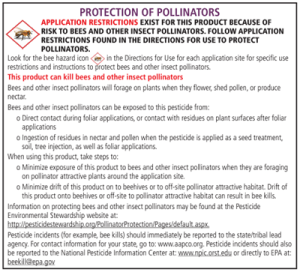Have you ever noticed on some insecticide labels there is a box with a picture of a honeybee that talks about protection of pollinators?
Several years ago, bees started mysteriously disappearing out of their hives. Beekeepers were rightly concerned, and entomologists started investigating causes. One of the ideas was that honeybees were adversely affected by neonicotinoids that are systemic in plants and can be transported through a plant and into the pollen of flowers which would then affect any bees that went to harvest that pollen.
 It appears after years of investigation that there are multiple confounding factors to what we have since named colony collapse disorder (CCD). Viruses, bacterial infections, reduced genetic diversity, insecticides, and parasites like varroa mites, are all part of the story of CCD. One of the things the EPA did to mitigate one of these factors, insecticides, was to add the Bee Advisory Box on insecticides that were suspected of negatively affecting bees.
It appears after years of investigation that there are multiple confounding factors to what we have since named colony collapse disorder (CCD). Viruses, bacterial infections, reduced genetic diversity, insecticides, and parasites like varroa mites, are all part of the story of CCD. One of the things the EPA did to mitigate one of these factors, insecticides, was to add the Bee Advisory Box on insecticides that were suspected of negatively affecting bees.
This box has some best practices for reducing risk to honeybees and other pollinators. There are a lot of other pollinators besides honeybees, such as solitary native bees, flies and other insects.
The Bee Advisory Box is one way to help reduce exposure to those non-targets. Please review and take precautions when using pesticides to protect our pollinators.

